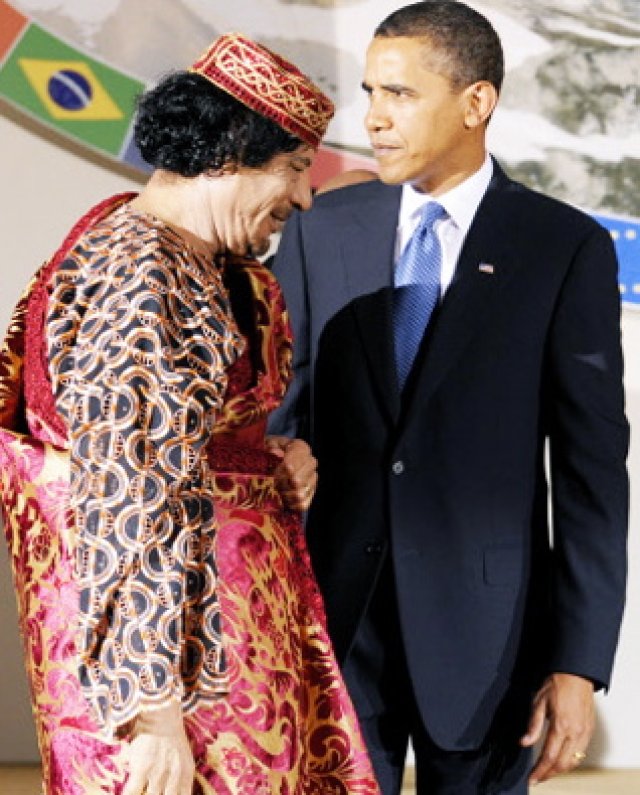
As Libyan dictator Muammar Gaddafi's regime crumbled on August 23 after a rebel uprising and NATO bombing, United States President Barack Obama said: "For over four decades, the Libyan people had lived under the rule of a tyrant who denied them their most basic human rights."
Obama would know ― his government's support in recent years allowed Gaddafi's regime to do so. Indeed, the NATO bombing campaign targeted Libyan forces the US had armed and trained.
Secret US diplomatic cables released by WikiLeaks confirmed the growing closeness between the US and Libyan governments in recent years.
Confirming the US's lack of concern about Gaddafi's human rights abuses and absence of democracy in the country, the cables show the two countries were close to “normalising” their relationship.
This process started in the mid-1990s, when Gaddafi began to open Libya to Western investment.
Gaddafi's shit to ally of the West was formalised in 2004 when then-British PM Tony Blair struck a deal with the Libyan regime.
A cable from the US embassy in Tripoli on August 19, 2009, details a meeting between a US congressional delegation led by former presidential candidate Senator John McCain and Muammar Gaddafi and his son Muatassim.
In the lead up to the meeting, a cable on August 10, 2009, said: “Libya has acted as a critical ally in U.S. counter-terrorism efforts, and Libya is considered one of our primary partners in combating the flow of foreign fighters. Our strategic partnership in this field has been highly productive and beneficial to both nations.
“Libya has stated its number one priority, in return for relinquishing WMD [Weapons of Mass Destruction], is a security guarantee by the U.S. against foreign aggression.
“To that end, Libya has expressed an interest in purchasing lethal weapons from U.S. firms.”
Discussion at the meeting focused on Libya's desire to buy “lethal and non-lethal military equipment” from US companies.
The August 19 cable said: “Senator McCain assured Muatassim that the United States wanted to provide Libya with the equipment it needs for its security.”
McCain also “pledged to see what he could do” about recovering eight military planes that Libya bought from Lockheed Martin in the 1970s but were never delivered.
The senators praised Libya's role as an ally in the US's “war on terror”, and said they wished to deepen the relationship.
McCain “described the bilateral military relationship as strong and pointed to Libyan officer training at U.S. Command, Staff, and War colleges as some of the best programs for Libyan military participation”.
The August 10 cable said the US had “begun some successful training programs to assist Libya in improving its security capabilities, under the rubrics of anti-terrorism assistance and border security”.
A cable from US Secretary of State Hillary Clinton on November 9, 2009, showed the US was selling spare parts to the Libyan air force via Portugal.
The cables said Clinton was concerned that the parts may not have been received by Libya. “US Customs records ... listed ultimate end-user of these items is the Portuguese Air Force, a party not authorized to received hardware under this license”.
Gaddafi was reported to have used air force jets to attack and kill pro-democracy protesters in Tripoli in February.
Salon.com said on March 23: “More than [US]$15 million in arms sales from U.S. manufacturers to Libya were authorized by the government in fiscal 2009 alone, according to the State Department...
“In 2008, $46 million in military sales were approved by the government.”
The increasingly close political ties between Washington and Tripoli benifitted US corporations seeking to take advantage of Libya's move to open its economy to foreign investment.
A December 18, 2007 cable from the US embassy in Tripoli reported: “U.S. companies AECOM and the Tennessee Overseas Construction Company (TOCC) inked separate deals worth a total of $2.0 to $3.0 billion with Libya's Housing and Infrastructure Board.”
The cable said: The GOL [government of Libya] apparently awarded the contracts to U.S. firms for at least partly political purposes, telling company representatives that the deals symbolize the fact that U.S.-Libyan ties have moved beyond strictly security (i.e., WMD and counter-terrorism) concerns.
“The agreements underscore that the GOL continues to directly link commercial contracts to political relationships.”
The US was also deeply interested in the restructuring of the Central Bank of Libya (CBL) as Libya moved to open more of its banking sector to foreign ownership, a March 23, 2008, cable said.
The US did not hide its desire to shape the way the bank operated, with a delegation seeking to “solicit updates on its training programs and openness to U.S. assistance”.
“Banking reform is moving ahead; we likely have a window of 18 to 24 months in which to contribute on the training and reform front,” the cable said.
The cable said several US firms were key advisers on CBL's restructure.
Documents found in the abandoned office of the former head of Libyan intelligence also showed evidence of close ties with US and British intelligence services, the New York Times said on September 4.
The documents suggest the US sent prisoners to be interrogated in Libya at least times as part of the “war on terror”.